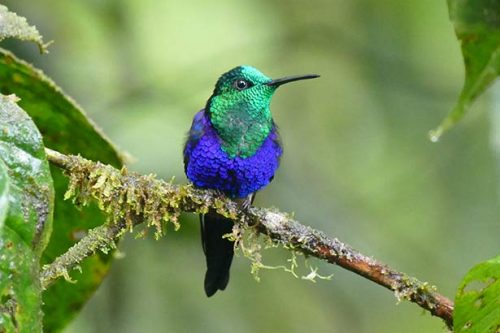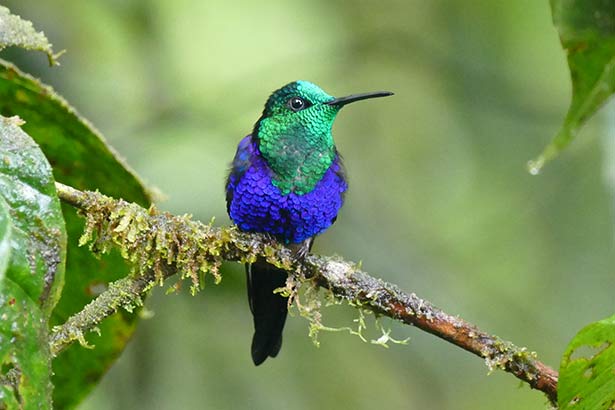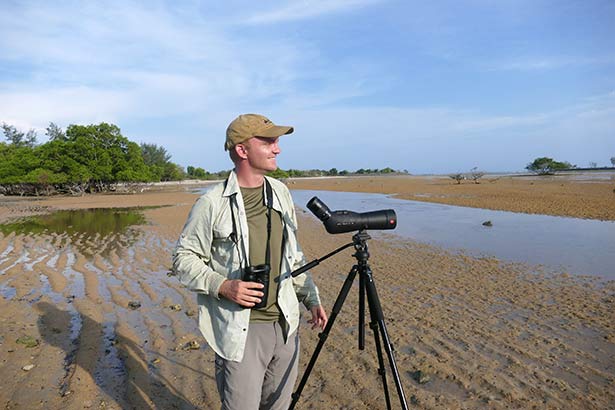

EW asked birder Noah Strycker a question we’ve been mulling over: Is birding a sport? In 2015, Stryker set a new world record by seeing almost 60 percent of the known bird species on Earth in a continuous round-the-world trip, traveling through 41 countries on all seven continents.
Defining a sport is like deciding what is or isn’t art: These things are devilishly squishy around the edges. When in doubt, it’s best, I think, to just ask someone if they consider themselves an athlete (or an artist). Sport is a definition of self, like art and so many other things.
Take birding, which is my particular passion. Is it a sport? For decades, birders have dealt with the tweedy, geranium-tending image, about as far as you can get from, say, your typical football player. In the 1960s, before birders got organized, few would have construed the hobby as the least bit sporty. But times have changed.
First, birders switched their name. Call someone a “birdwatcher” and you might as well write them into an Agatha Christie novel. We dropped the watching long ago; these days, the verb arises straight from the noun, like grilling or hot air ballooning or skiing. Birdwatching sounds passive and eccentric. Birding, by contrast, is direct action, which is a significant step.
One of sport’s inherent qualities is the presence of rules, and birders love rules. In the U.S., the American Birding Association (ABA) holds regular meetings of its Recording Standards and Ethics Committee, which maintains a 1,900-word document, plus appendices, listing exactly when, where and why you can count a sighting on your life list. For instance, Rule 3B(iv) states, “A bird that is not wild and which later moves unassisted to a new location … is still not wild.”
There are specific rules about oceanic jurisdictions, hybrids, birding by webcam and even the exact definition of the word “alive.” To play fair, everyone needs to be on the same page.
Another feature of sports is their competitive nature, and birders are as competitive as anyone. Each May, New Jersey’s World Series of Birding pits teams against each other to record the most species in a day; the event brings in judges and sponsors, and winners hoist trophies (while raising hundreds of thousands of dollars for bird conservation). There are other, similar events in Israel, Peru, Taiwan and elsewhere around the world.
Meanwhile, the ABA publishes people’s lists in an annual, phonebook-like compendium — a literal ranking of birders’ achievements.
According to most dictionaries, sports must include some degree of honed physical skill, and this is where birding doesn’t always fit the mold. Sure, it can be grueling — I have scaled mountains for birds, endured horrendous weather and spent hours at a time hoisting binoculars (hey, try it sometime!). But the skill of birding is more mental than physical, and to define it as an athletic pursuit is a stretch.
 |
| Globetrotting birder Noah Strycker. Photos courtesy Noah Strycker. |
I suppose I am as likely as any birding athlete. In 2015, I traveled through 41 countries to see 6,042 species of birds, a new world record. To prepare for this adventure, I trained my mind and body with a regimen of field guides and, yes, gym workouts; staying healthy on the road was as important as identifying each new species. One might argue that this type of birding is like an ultramarathon, and the comparison is convenient. It’s not quite right, though, because birding is so much more.
Birding might be a game, a logic puzzle or an art form. It’s collecting, it’s hunting without killing, it’s meditation. Birding is a hobby and a lifestyle — a postmodern treasure hunt. It is whatever you want to make of it, and that’s why I hesitate to call it a sport: The term is just too limiting. Sports exist within a narrow set of boundaries. While the pursuit of birds sometimes overlaps those bounds, it falls a long way outside them, too.
For me, in other words, birding isn’t ESPN2 — it’s the Discovery Channel.